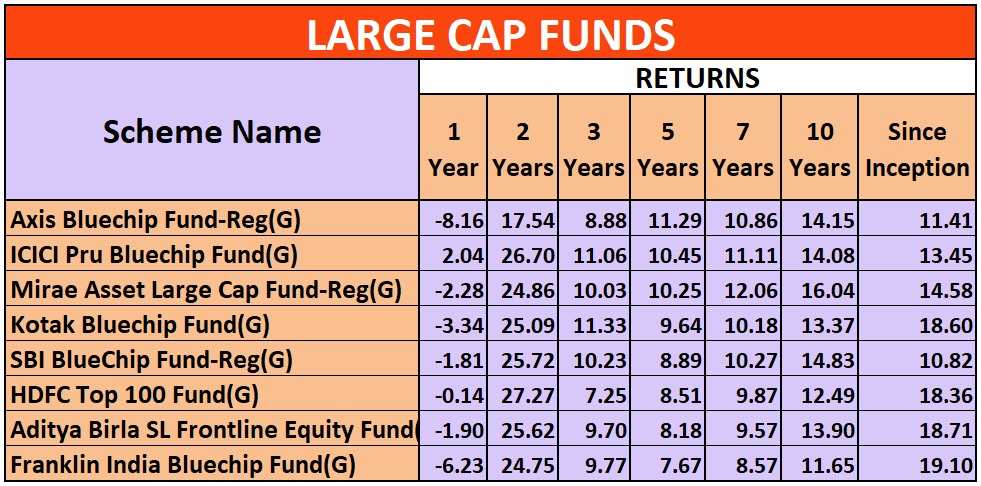Equity |
July 02, 2022How Large-Cap Equity Funds can be your master stroke in Investment
We all have some dreams that we aspire to achieve in our life. The story of Rano is similar to one of us. She wanted to study management for higher studies. But, her family couldn't afford a hefty fee for her education. It is not something new. Like Rano, several more children fail to pursue their studies due to financial reasons.
But Rano’s story is different. One day, when Rano was in her college’s first year, she came across a newspaper advertisement that said, Equity Funds are subjected to market risk. She frantically started to search more about this line. While surfing on the internet, she finally got a good piece to study on Equity Mutual Funds.
It read: Equity Mutual Funds invest the pooled corpus of money in shares of different companies. In simple terms, equity mutual funds invest in shares on your behalf. Unable to understand at first, she continued to read more. Under this 65% of the portfolio has to comprise investments in equity and equity-related instruments; the rest can be invested in money market instruments or debt securities as per the investment objective of the scheme. When compared to other types of mutual funds, equity fund investments are associated with a higher level of risk but are also expected to generate higher returns.

The moment she learned about higher returns, she quickly jumped over the next line which said, Furthermore, there is no such thing as a "one-size-fits-all" equity fund. There are many different types of equity funds based on investment strategy, market capitalization, and taxation benefits, each with its own investment objective, that must be matched to your risk profile.
After a while and giving thought to what she had read, she began thinking if she can ask her father to invest in an equity mutual fund?
She went to her dad and explained everything. She also added that the key advantage of investing in equity mutual funds is that it has inflation beating returns. This indicates that, despite rising inflation and market growth, your returns will be sufficient to compensate for these effects. Investing in equity mutual funds enables the investor to have a diversified portfolio as when you invest in equity mutual funds, your money is divided among several companies based on their sectors.
Furthermore, losses in one stock can be compensated by the gains in other stocks. Moreover, these mutual funds are managed by professionals which makes investing easier for you. She said, dad, why don’t we together start investing in mutual funds? My internship and your savings can help me pay my fee for the MBA program. And maybe we can also take help from some professional analysts to understand equity mutual funds in-depth?
Her dad agreed to talk to the concerned person, and they dialed a number that said, we can help you invest with ease. The analyst picked the call, and Rano’s dad started the conversation by saying, my daughter wants to study MBA, but we won’t be able to save enough for her education. Do you mind helping us, how can mutual funds help me save this much amount in the next 3-4 years? The analyst understood their concern and began explaining to them about the different types of investment caps.
He said, There are three types of caps. Large, Mid, and Low. However, one should also look at the factors affecting equity mutual funds before investing. If you look at the level of risk involved, it is comparatively higher than other types of mutual funds because stock prices can be affected due to market fluctuations. Small-cap and Mid-cap funds have a high-risk profile, but they also provide considerably higher growth.
On the other hand, in the case of large-cap funds, which I think would be perfect for your daughter’s funds, they provide good returns and significantly cut down the investment risks which will hence help you collect enough money for her education. Therefore, depending on your risk appetite you can choose which type of equity fund you want to invest in.
What are Large Cap funds?
Large-cap funds are those funds that invest a big or larger proportion of their corpus in the top 100 companies by market capitalization, as defined by SEBI.
Are they risky?
Market risk exists but is comparatively lower from small cap and mid cap funds due to the financial health of the companies. Investors should be prepared for possible moderate losses.
What are the usual returns?
Usually provide stable and more predictable returns, but lesser growth potential due to the size of the companies.
What about the time horizon?
Generally, have a time horizon of 3-5 years because the companies are mature and can provide capital appreciation over this period.
Are they safe investments?
The funds are known as safer form. They can easily withstand the bear market. Also, they can deliver stable returns when compared to the middle and the small cap funds.
Why should I invest in large cap funds?
Well, those companies which have a market capitalization of more than Rs. 20,000 crore come under large cap funds. These companies have a good track record which is also backed by good governance practices. So, you can develop your trust since they abide by the healthy corporate ethics.
Who should invest in large cap funds?
Since these funds are less volatile in nature relative to other funds and their performance is generally stable, it makes investors less vulnerable to the equity market. If someone is looking to diversify their portfolio, large cap funds are more suitable. If you don’t want to take high risks and want to stick with pretty returns, then you must think of investing in it.
Are there any factors that an investor should consider here? Yes, you can look for:
What is investment purpose or objective?
What has been the past performance of large cap funds
How much experience does the fund manager have?
What is the expense or cost ratio and how will it impact?
This will help you understand if large-caps funds are your preference? I believe, if you have 3-4 years and you want to get a stable yet good return that is not volatile as well, then large-cap funds are the most suitable ones for your daughter’s education. The analyst said. He also added that the fundamental goal of investing in equities mutual funds is to increase your wealth at a faster rate than inflation. Equity fund returns are significantly higher than those of other mutual fund types. Also, for people searching for a short-term investment, equities investments are not the best option, so at least 3-4 years investment is the best. After listening to the analysts, Rano and her dad agreed to invest in Equity Mutual Funds with a large-cap.
They couldn't believe that the analyst was right. They had a genuine amount of deposit in their bank account after 4 years of investment with a large cap. And they now had enough money to pay for Rano’s MBA program fee. Now, this was an emotional moment for both Rano and her dad. Afterall why not? All thanks to Rano’s curiosity to know and courage to take the risk.
One more important lesson to learn here. Most of us give up on our dreams due to lack of money, but money is not an intrinsic value; it can be generated through timely investment. And Rano proved it through Equity Mutual Funds.
As of 16th June 2022 - TOP Large cap funds are as follow:
